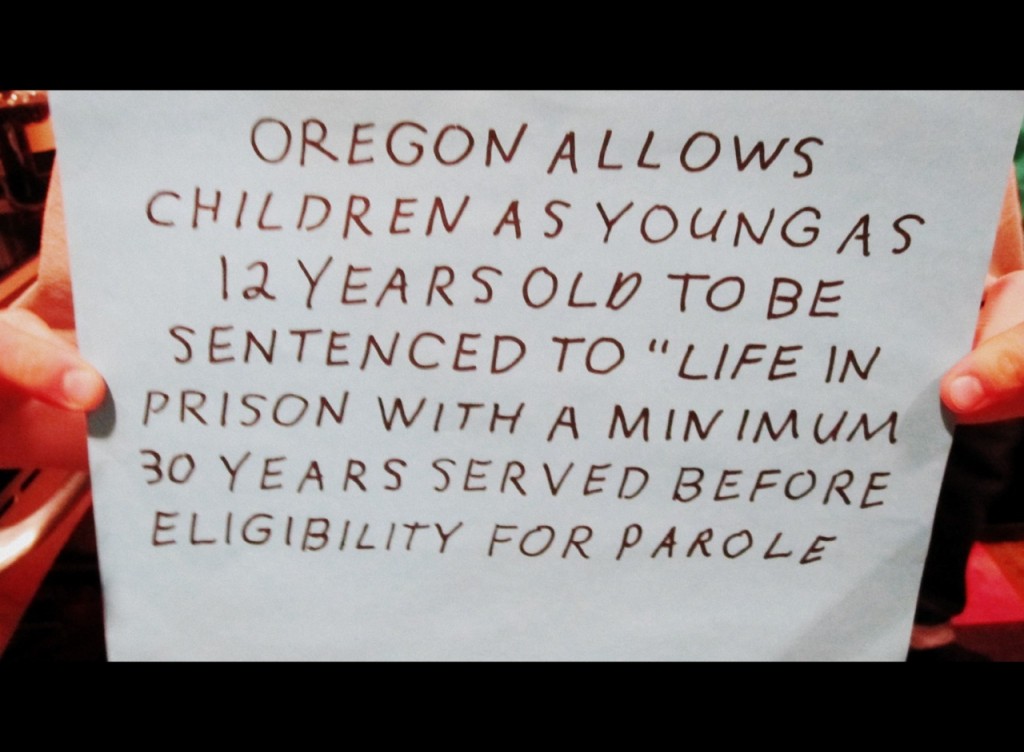This post is in response to a comment on my earlier post The Irony is Killing US: When to Treat Juveniles as Adults. It was written by an inside student after I shared that blog post – and the comments – with a couple of men in my Inside-Out class at the state penitentiary who were convicted as juveniles (they do not have internet access, so I shared a paper printout and was given a handwritten response). These are his words:
 “People are versatile.” I pulled this from what was written in the previous comment. Absolutely, I agree. Beyond that, and in support of that very idea is that “everyone is different,” as no two people or situations are the same. Do I believe that there are some juveniles who once imprisoned should at no point thereafter be released? Yes, I do believe that, however, not based solely on that act which first put them in prison. To say that any choice made as a juvenile discounts one’s ability to grow, learn, change, and become a productive member of society…for the rest of their life! No, not now and not ever. One can change at any stage in life, for better or worse, we as humans are continually going through changes from the moment we are conceived to the moment we pass from life to death, this is simply in our nature. I don’t believe it is just in any way, shape or form to label a juvenile as “scum” that cannot ever change and therefore be sentenced to “Life in Prison” when at that age there remains such an incredible amount of potential for both growth and change. It does no harm to allow someone hope; condemning an individual, especially a juvenile, closes doors we as a society have no right to close. Can anyone know the future? No matter what position of authority is held, I’ll not be convinced that the act of a minor guarantee the outcome of their future based on decisions made as a juvenile.
“People are versatile.” I pulled this from what was written in the previous comment. Absolutely, I agree. Beyond that, and in support of that very idea is that “everyone is different,” as no two people or situations are the same. Do I believe that there are some juveniles who once imprisoned should at no point thereafter be released? Yes, I do believe that, however, not based solely on that act which first put them in prison. To say that any choice made as a juvenile discounts one’s ability to grow, learn, change, and become a productive member of society…for the rest of their life! No, not now and not ever. One can change at any stage in life, for better or worse, we as humans are continually going through changes from the moment we are conceived to the moment we pass from life to death, this is simply in our nature. I don’t believe it is just in any way, shape or form to label a juvenile as “scum” that cannot ever change and therefore be sentenced to “Life in Prison” when at that age there remains such an incredible amount of potential for both growth and change. It does no harm to allow someone hope; condemning an individual, especially a juvenile, closes doors we as a society have no right to close. Can anyone know the future? No matter what position of authority is held, I’ll not be convinced that the act of a minor guarantee the outcome of their future based on decisions made as a juvenile.
the photo is from OSU’s Inside-Out tumblr page: We Are the 1 in 100

Comments 5
Letta Page — October 30, 2012
I'm so struck by the line, "It does no harm to allow someone hope." Thanks for sharing your student's response, Michelle!
Michelle Inderbitzin — October 30, 2012
Thanks, Letta. I'll pass your comment along to the author when I see him in class next week.
Diana — December 8, 2012
What is the difference between children and adults? In my opinion, it is their adaptability in various situations. As one grows older, he or she become more fixed in their ways but young children, as stated in the article, are very versatile, especially those as young as twelve. I really agree with your statement: "I don’t believe it is just in any way, shape or form to label a juvenile as “scum” that cannot ever change and therefore be sentenced to “Life in Prison” when at that age there remains such an incredible amount of potential for both growth and change". I think it is absolutely ridiculous that Oregon, or any state, allows children as young as 12 years old to be sentenced to life in prison with a minimum 30 years served before eligibility for parole. Twelve year old children should be in 6th or 7th grade, figuring out their life through their awkward middle school age, not locked up in prisons where they have to spend pretty much the rest of their life. I believe everyone, no matter their age, should get second chances, and especially when it comes to punishing children, we must realize that they make mistakes and these mistakes should not cost them the rest of their life.
click — March 1, 2019
There are the amazing and the great post here it is the amazing way to follow here see wifi password windows 10 and need to to find wifi password on windows 10.
saaki assi assi — November 23, 2020
Talk about youth prisions is here so i hope best essays review will be really good for you and you would love to try this out for me and them as it can also be used in future years as well as for these days. I hope that it would be really good now as we all need to try that.